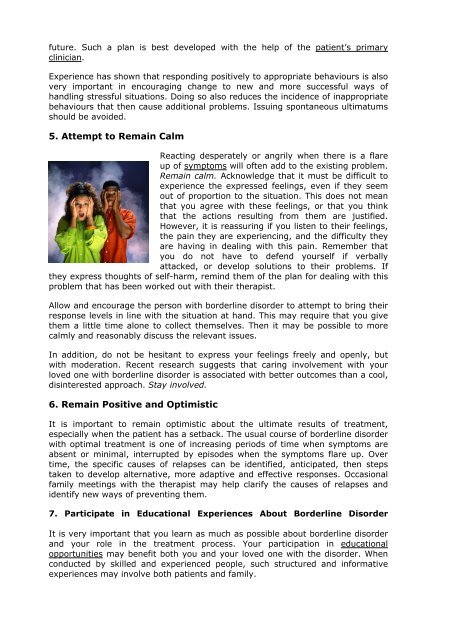personality disorders explained
Antisocial Personality Disorder, Codependence, Narcissism and Borderline
Antisocial Personality Disorder, Codependence, Narcissism and Borderline
You also want an ePaper? Increase the reach of your titles
YUMPU automatically turns print PDFs into web optimized ePapers that Google loves.
future. Such a plan is best developed with the help of the patient’s primary<br />
clinician.<br />
Experience has shown that responding positively to appropriate behaviours is also<br />
very important in encouraging change to new and more successful ways of<br />
handling stressful situations. Doing so also reduces the incidence of inappropriate<br />
behaviours that then cause additional problems. Issuing spontaneous ultimatums<br />
should be avoided.<br />
5. Attempt to Remain Calm<br />
Reacting desperately or angrily when there is a flare<br />
up of symptoms will often add to the existing problem.<br />
Remain calm. Acknowledge that it must be difficult to<br />
experience the expressed feelings, even if they seem<br />
out of proportion to the situation. This does not mean<br />
that you agree with these feelings, or that you think<br />
that the actions resulting from them are justified.<br />
However, it is reassuring if you listen to their feelings,<br />
the pain they are experiencing, and the difficulty they<br />
are having in dealing with this pain. Remember that<br />
you do not have to defend yourself if verbally<br />
attacked, or develop solutions to their problems. If<br />
they express thoughts of self-harm, remind them of the plan for dealing with this<br />
problem that has been worked out with their therapist.<br />
Allow and encourage the person with borderline disorder to attempt to bring their<br />
response levels in line with the situation at hand. This may require that you give<br />
them a little time alone to collect themselves. Then it may be possible to more<br />
calmly and reasonably discuss the relevant issues.<br />
In addition, do not be hesitant to express your feelings freely and openly, but<br />
with moderation. Recent research suggests that caring involvement with your<br />
loved one with borderline disorder is associated with better outcomes than a cool,<br />
disinterested approach. Stay involved.<br />
6. Remain Positive and Optimistic<br />
It is important to remain optimistic about the ultimate results of treatment,<br />
especially when the patient has a setback. The usual course of borderline disorder<br />
with optimal treatment is one of increasing periods of time when symptoms are<br />
absent or minimal, interrupted by episodes when the symptoms flare up. Over<br />
time, the specific causes of relapses can be identified, anticipated, then steps<br />
taken to develop alternative, more adaptive and effective responses. Occasional<br />
family meetings with the therapist may help clarify the causes of relapses and<br />
identify new ways of preventing them.<br />
7. Participate in Educational Experiences About Borderline Disorder<br />
It is very important that you learn as much as possible about borderline disorder<br />
and your role in the treatment process. Your participation in educational<br />
opportunities may benefit both you and your loved one with the disorder. When<br />
conducted by skilled and experienced people, such structured and informative<br />
experiences may involve both patients and family.

















